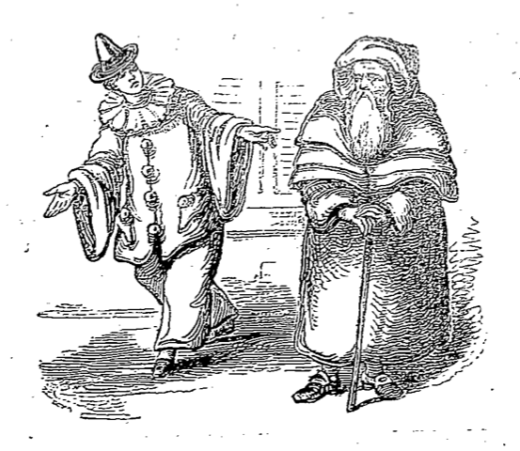
Printed
10 pages
Author(s)
Le Bonhomme Janvier
The play Le Bonhomme Janvier (The January Man) is part of the collection Guignol : Livre de la jeunesse (Guignol: Book of youth), arranged and improved by Alfred des Essarts. It is composed of novels, short stories, poems, articles, and a collection of puppet plays gathered under the label “Théâtre Guignol”. However, it is not an authentic transcription of the real Théâtre Guignol, but a rather loose and light-hearted adaptation destined for children. The word “Guignol” only refers to the use of a hand-puppet booth, regardless of the character. The plays from this repertoire have an edifying dimension, and aim at instilling good manners in young spectators.
The Bonhomme Janvier is the precursor of Father Christmas.
A man lectures ungrateful children
The Bonhomme Janvier (January Man), who came all the way from the infinity of space to Earth on New Year’s day, is welcomed by Pierrot. It is his first visit since the capture of Carthage, and he notices a lot of changes. Later, Pierrot’s clever uncle Gorgibus arrives. He talks to the Bonhomme Janvier with a lot of irony and contempt. He tries to hit him with a stick but fails: Janvier uses a magic trick and Gorgibus ends up frozen for the eight first days of the year.
Shortly after, two children, Arlequin and Léandre, arrive. Pierrot and the Bonhomme Janvier make themselves invisible to listen to their conversation. The two boys complain about the useless and outmoded presents they were given. Pierrot and the Bonhomme Janvier reappear at this very moment. Janvier decides to take back all their presents to teach them a lesson.
Paulin, Jacques Labor’s son, arrives. Invisible again, Pierrot and the Bonhomme Janvier listen to him talk about New Year. Unlike the others, Paulin expresses hope and enthusiasm regarding the year to come; the Bonhomme Janvier is surprised. Paulin’s father joins him and shares the same thoughts. Touched by the wisdom of the child, the Bonhomme Janvier promises to reward him. As for the other children, he decides to cancel their presents for the following year.
Publications and translations
Alfred des Essarts, Guignol : livre de la jeunesse. Paris: Librairie parisienne, Dupray de la Mahérie, 1863.
